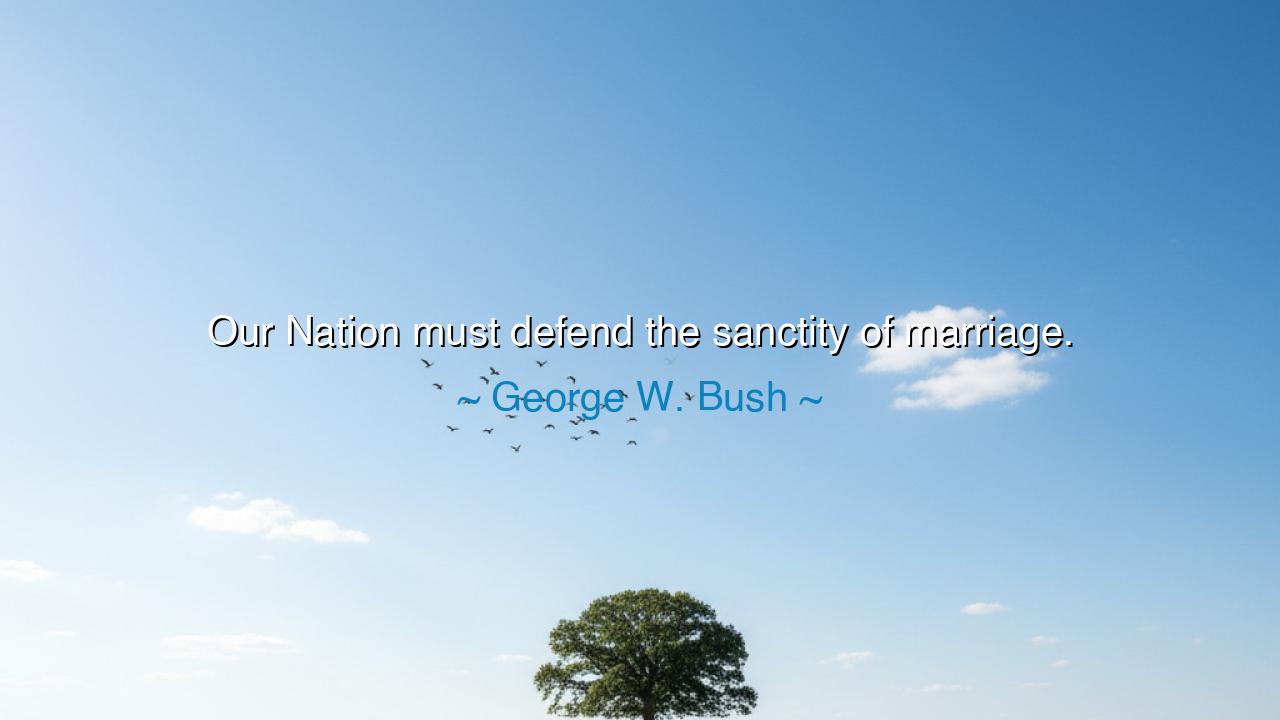
Our Nation must defend the sanctity of marriage.






In the solemn and stirring words of George W. Bush, spoken during a time of deep national reflection, we hear an invocation of ancient moral duty: “Our Nation must defend the sanctity of marriage.” Though uttered in the political arena, these words reach beyond laws and legislatures; they speak to the eternal covenant of the human spirit—the union between man and woman, between family and faith, between the private heart and the public order. Bush’s call was not merely for policy, but for remembrance—for a nation adrift in change to look back toward the sacred foundation upon which its homes and hopes were built.
The origin of this quote lies in the early years of the twenty-first century, a time when America wrestled with shifting understandings of family, morality, and identity. In that hour of contention, Bush sought to anchor the heart of the nation in what he believed to be sacred tradition—that marriage, as ordained in the moral vision of its founders and in the faiths that shaped civilization, was not merely a contract but a covenant, a vow made before God and community alike. To defend its sanctity, then, was to guard the soul of the nation from becoming unmoored in the tides of modernity. Whether one agreed or not with his vision, the power of his words lay in their appeal to the deep human longing for permanence in a fleeting world.
Throughout the ages, marriage has been the cornerstone of civilization’s endurance. From the dawn of tribes to the rise of empires, the union of two souls in fidelity has formed the smallest yet strongest fortress against chaos. It is not only a personal bond—it is a social covenant, a promise that the next generation will inherit stability, nurture, and moral direction. Bush’s plea to “defend the sanctity” of this bond was, in essence, a call to preserve the moral infrastructure upon which nations stand. For when the home falters, so too does the state; when families fragment, societies unravel.
Consider the tale of Marcus Aurelius, the philosopher-emperor of Rome. Though surrounded by the decadence of an empire losing its virtue, he sought in his writings and his life to uphold discipline, devotion, and the sanctity of duty—within both the household and the state. His meditations remind us that the strength of a nation is the reflection of the integrity of its families. Bush’s words echo this same ancient wisdom: to protect marriage is to protect the moral order, the soil in which virtue grows. For love without duty, freedom without faith, soon devolves into an emptiness that neither law nor wealth can fill.
And yet, the sanctity of marriage is not defended by decree alone. It is defended in the quiet fidelity of everyday lives—by spouses who forgive, by parents who endure, by lovers who choose patience over pride. A nation may legislate structure, but only hearts can preserve sanctity. Bush’s call, when stripped of its political garments, becomes a spiritual exhortation to every individual: to live in truth, to honor one’s vows, and to see in love not mere sentiment, but sacred responsibility. For sanctity is not preserved by argument—it is lived, embodied, and passed on through generations.
But his words also invite reflection on a deeper truth: to defend something sacred, one must first understand its holiness. In an age of division, the meaning of marriage itself is debated and redefined. Yet beneath all contention lies a shared yearning—for love that endures, for belonging that redeems, for the assurance that faith and fidelity still matter in a world that changes too quickly. The defense of sanctity, then, must not be one of exclusion, but of remembrance: to recall that the essence of marriage, in all its forms, lies in selflessness, in service, in the merging of two lives toward a common good.
Let this teaching, therefore, be carved upon the hearts of those who would build lasting homes and enduring nations: defend the sanctity of your promises. Whether to a partner, a child, or your own soul, let your word be a covenant, not a convenience. The strength of a people is measured not in armies or wealth, but in the faithfulness of its families. When homes are founded upon honor, nations do not fall.
And thus, in the enduring echo of George W. Bush’s call, we hear a timeless summons—to rise as guardians not merely of institutions, but of ideals. The sanctity of marriage is not a relic of the past; it is a living reminder that love, loyalty, and moral courage remain the pillars upon which every generation must stand. Defend them not only in law, but in life. For in doing so, we defend the sacred thread that binds humanity together—the covenant of the heart that no time, nor trial, can undo.






AAdministratorAdministrator
Welcome, honored guests. Please leave a comment, we will respond soon